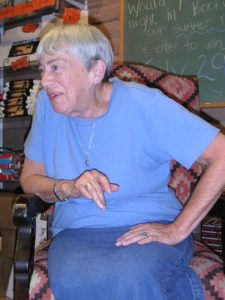 When on January 22nd Ursula K. Le Guin’s family announced that she has passed away in her sleep at the age of 88 years, it was generally agreed that the world has not just lost one of the greatest writers in the history of science fiction but a major literary figure in general. Born as the daughter of the noted anthropologist Alfred Louis Kroeber and the writer Theodora Kracaw, Le Guin became best known in the 1960ies with the initial three volumens of her young adult fantasy series Earthsea and expecially with her Hainish sequence of science fiction novels and tales. Two novels of the latter cycle, The Left Hand of Darkness (1969) and The Dispossessed (1974), are generally regarded as masterpieces and are among the most important works in science fiction. Le Guin’s work, however, has extended far beyond science fiction and fantasy and includes poetry and essay collections, literary criticism and alternate history fiction. She has influenced countless other writers, among them such luminous figures as Salman Rushdie, David Mitchell or Neil Gaiman. Outstanding among her many awards was the reception of the National Book Foundation Medal for Distinguished Contribution to American Letters in 2014. In recent years she has also repatedly been regarded as a serious contender for a Nobel Prize in literature.
When on January 22nd Ursula K. Le Guin’s family announced that she has passed away in her sleep at the age of 88 years, it was generally agreed that the world has not just lost one of the greatest writers in the history of science fiction but a major literary figure in general. Born as the daughter of the noted anthropologist Alfred Louis Kroeber and the writer Theodora Kracaw, Le Guin became best known in the 1960ies with the initial three volumens of her young adult fantasy series Earthsea and expecially with her Hainish sequence of science fiction novels and tales. Two novels of the latter cycle, The Left Hand of Darkness (1969) and The Dispossessed (1974), are generally regarded as masterpieces and are among the most important works in science fiction. Le Guin’s work, however, has extended far beyond science fiction and fantasy and includes poetry and essay collections, literary criticism and alternate history fiction. She has influenced countless other writers, among them such luminous figures as Salman Rushdie, David Mitchell or Neil Gaiman. Outstanding among her many awards was the reception of the National Book Foundation Medal for Distinguished Contribution to American Letters in 2014. In recent years she has also repatedly been regarded as a serious contender for a Nobel Prize in literature.
The World Culture Hub will not limit its appreciation of this marvellous writer to a short notice. We plan to upload a closer discussion especially of her novel The Dispossed in the course of the year.
Photo taken by Hajor, 15.Jul.2004. Released under cc.by.sa and/or GFDL.